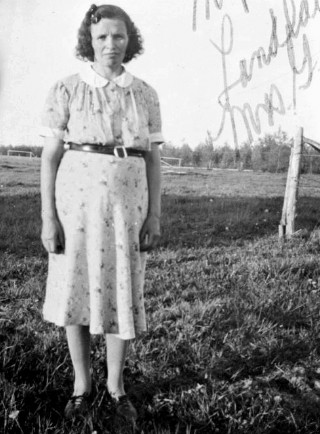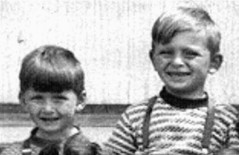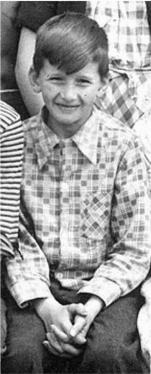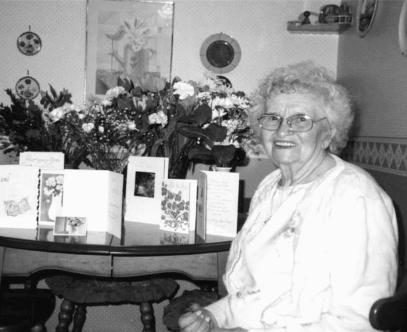Fiercely Canadian.
By Dan Giecko.
Giecko, John & Agatha
Children: Luba, Danny, John
Hearst Relatives: Trowsse, Guty.
I have often wondered why my parents never talked much about their lives in Eastern Europe; why my brother Johnny and I never learned much about grandparents and relatives. They talked in general terms about the "Old Country," or "the village," but that was all. For background for this piece, I talked to John Guty in Ottawa, whose parents were my Mom and Dadís close friends and from the same village. Internet searches were helpful, too. I soon realized how difficult life had been in Europe.
Perhaps thatís why Mom and Dad had such love for Canada. They were hardworking Ukrainians who never took Canada for granted, nor asked for anything they hadnít earned. It also explains Motherís mission to ensure that Johnny and I had a life better than she had experienced in Europe.
My parents, John Giecko (1895) and Agatha Pawelko (1905), were born in a small village named Kulno. The political map of Eastern Europe was quite different at the time. There were three main empires – Germany, Austria-Hungary and Russia. Kulno was on the Austria-Hungary border with Russia. The "Ukraine" was simply a territory with Ukrainian-speaking people occupying a part of both Austria-Hungary and Russia. The Ukrainian community, like many other ethnic communities in Europe, hoped for independence with the defeat of the Austro-Hungarian Empire after World War I. But it was not to be. With the new political lines drawn, a small, western portion of the Ukraine was incorporated into Poland, and the larger eastern area became part of the Soviet Union. The village of Kulno still exists and is located in east Poland.
After World War I, many people of Ukrainian descent started emigrating to other countries. They had many reasons to leave: discrimination against Ukrainians, no Ukrainian schools, and no churches provided for Ukrainians who wanted to practise their own version of Orthodox Christianity, as opposed to the dominant religions of Russian Orthodox and Ukrainian Catholicism. Finally, there was widespread poverty – my parentsí families were very poor and mother only had a Grade 4 education, because she had to work to support her family. Her father and brothers had been forced into the military, so my mother, at twelve, lied about her age in order to work underground in a coal mine. She once remarked that, because of her small stature, the underground crew used her to get into the smaller areas of the mine. She also sold baked potatoes and sour cream to soldiers travelling through town on the railway. And she learned the craft of sewing that would serve her so well later on.
My father had served time in the Polish military, but was now surviving as a peasant farmer. There was the promise of regular work in Canada. Clearly it was time to leave. Canada was an attractive country, especially western Canada, because it had similarities in climate and terrain to Kulno. Also, a Polish passport was easy to obtain and allowed relatively free travel. Finally, and above all else, a move to a democratic country was a big attraction. One remaining hurdle was sponsorship by someone already in Canada. John Gutyís father, Stefan, had arrived in Canada in 1926 and was willing to sponsor Dad. There was a family connection as well; Stefanís brother was married to my fatherís sister. A major drawback was that Mom was nearing the end of her pregnancy with my sister Luba. The decision was made for Dad to leave, get settled and then bring my mom and sister to Canada. Luba was born on July 26, 1927, in Kulno. Mom was now responsible for raising Luba as well as supporting her mother, since my grandfather had been killed in the war.
My father arrived in Quebec City on May 6, 1927, on the Minnedosa, part of the Canadian Pacific Fleet. He was thirty-one. By this time, Stefan Guty, who had started in Manitoba, was working on the CNR between Nakina and Hearst. Father met up with him and started working for the railway as well. It was hard, unskilled work, but it was steady. Mr. Guty once said that it was great to start and end work in daylight, a reference to the long work hours in Europe. Gradually they moved eastwards to the Pagwa section. It took years, but finally my father had saved enough money for a small farm west of Hearst, at Ryland. It was time to get my mother and Luba to Canada.
Mother and Luba left Warsaw on February 23, 1937, travelling by rail to Gdynia, Poland, by boat to Le Havre and then aboard the RMS Alaunia (a Cunard liner) to Halifax. They arrived on March 14, 1937. My mother was thirty-two and Luba nine. Luba was meeting her father for the first time.

Agatha Giecko in Ryland, about 1942
They settled into the house in Ryland. I was born on December 23, 1941, and my brother Johnny on January 13, 1943. Father continued working for the CNR as a labourer, and both Mother and Father worked the farm. We had dairy cattle, beef cattle and pigs, and Mom grew as much produce as she could. It was a tough life, but much better than what they came from. It is important to note that, despite the fact that both parents had a very limited education, they taught themselves to read and write in English. I used to giggle when Mother spelled words phonetically. The spelling was wrong, but I never had a problem reading her notes and letters. Luba enrolled in the elementary school in Ryland in September 1937. When completed, she moved to Hearst to live with the Melnychuk family for secondary school. It was around that time (summer of 1942) that she met a young man named Walter Craig (Chum) Trowsse, the man she would eventually marry on July 26, 1946, at the age of nineteen.

Johnny & Danny Giecko, 1949

Johnny, 1953

Luba, about 1940
Johnny and I started at the Ryland Elementary School in 1947, but the following year, the farm was sold and our family moved to Hearst so we could attend HPS. The family bought a small house on Prince Street, and Father transferred to the railyard in town. Mother took on a new challenge – that of seamstress and tailor. Cuffs on pants were very much in vogue, and the various clothiers in town (Westís, Chalykoffís, Wilsonís) would send their pants to Mother for cuffs and alterations. She also did fancy sewing. I remember her outfitting an entire bridal party. She was so skilled at dressmaking that she never used a pattern. Rather, she would measure the client and use that as her base. She took pride in the quality of her work. I firmly believe that she was already planning Johnnyís future and mine and our future move to Toronto.
Johnny and I both attended Hearst High. I began in September 1954, Johnny a year later. We knew then, that when I completed Grade 12, we would be moving to Toronto. By Grade 11, I started to realize that I wanted to pursue a career in sports. I played high school basketball and town hockey, but I was crazy about anything pertaining to athletics. In my mind, I wanted to get a degree in physical education and return to Hearst as a recreation director. Johnny was far more academic with an interest in engineering.
Hearst was a fun place to grow up in. It was great attending a small secondary school. Close relationships were forged, many of which continue today. Although I donít see old classmates as often as I would like, it is special when we do meet: Terry West, Yvon and Marcel Brochu and Robert and Ray Wilson, to name a few. The Brochu family was our neighbour on Prince Street. They were a typically large French-Canadian family, but if I knocked on their door at dinnertime, and I often timed my arrival carefully, chairs would magically shift and an extra plate set out with soup, homemade bread, meat, potatoes and salad. Mme. Brochu is an extraordinary mother to have raised such a great family.
As a boy, my interests involved hockey, basketball and swimming at the "pump house," where I found a new respect for water after almost drowning. If Wayne Smith hadnít pulled me from the river, I would certainly have drowned. Later, if someone had a car, weíd swim at Lac Ste. Thérèse, or the gravel pit. Occasionally, we were mischievous. I remember Mr. Brown giving the Grades 7 and 8 boys the strap for throwing snowballs at the high school kids one lunch hour. Even though I was involved, I was safe and sound in Miss Hellings' Grade 6 class. Itís surprising that so many of us ended up teaching, since we had caused so much grief for our teachers in high school. I think Yvon Brochu and I were always on a mission to see who could get tossed out of Mme. Charbonneauís class first. We ended up in the basement pilfering pop from the storage closet while getting a head start on homework. Don Banks was usually in the mix as well. Mr. Lavoieís science class was a common target. Terry West had to dig himself out of a hole during one class when Mr. Lavoie thought that Terry had "dissed" him.
In the summer of 1958, Mother moved us to Toronto, where Johnny and I registered at Humberside Collegiate. The shock of moving from a school with four teachers and approximately 100 students to a collegiate with 2,000 was reflected in my marks – they plummeted. Two things saved me. Mr. Griffiths was a vice-principal at Humberside, who spent many hours after classes tutoring me. My marks improved dramatically. I also made the schoolís junior basketball team, a team that won the city championship in 1958-59. It gave me a sense of belonging. But the Hearst attraction was still strong. Every holiday, the three of us would return to Hearst. Luba, Chum, my nieces, nephews and friends were still there, and it was always fun catching up. Also my father, who wanted to stay in Hearst until he retired, was still living in the family home on Prince Street. I would return to Hearst for summers to work.
My mother continued to work in Toronto. At first, she got a job sewing dresses in a garment factory on Spadina Avenue. It was, in fact, a "sweat shop," which frustrated her with the emphasis on speed, not quality. She found work at Toronto Western Hospital in the sewing room, where the pace was less hectic. Later, she also became a nurseís assistant.
In September of 1959, I began a three-year physical education program at the University of Toronto. I graduated in 1962 with a Bachelor of Physical Education degree and began thinking about a career in education rather than that as a recreation director. As a result, I did a fourth year at U of T to earn a BA, followed by a year at the College of Education to get my teaching certificate. I was fortunate enough to land a position at Downsview Secondary School in North York, where I began teaching phys ed. I taught there for my entire career. When I think back, I realize that I made good choices. Besides teaching, I loved the "team" atmosphere of coaching and was happy to work with kids who needed a male role model. When you move into administration, you lose contact with students. I liked that daily interaction in class and on the playing field.
It was during my first year of teaching that my brother Johnny was diagnosed with Hodgkinís disease. Sadly, he passed away in March 1966. He had just graduated from electrical engineering and had begun working for Canada Wire and Cable in Toronto. The loss was difficult for the family. Mother was devastated. Johnny had always been devoted to her. No mother wants to outlive her child.
I have been retired since 1998 and now live in Barrie where I focus on golf. It hasnít improved, but my downhill skiing has. I have three daughters from a previous marriage with Diane – Tara, Tiffany, Taia – and a granddaughter. I am proud of them all. When my marriage ended, I shared fifteen years with Marianne Lentsius in Oakville, also a phys ed teacher, until she died of a malignant brain tumor in 2002. I now have a new partner in Nancy Southam.
My father died in Toronto in 1975. More recent years have been especially difficult. Mother lived to ninety-two and was in an extended-care facility in Chilliwack, British Columbia, when she passed away in April 1997. Both Chum and Luba died of cancer within months of each other in 1999, Luba at seventy-two and Chum at seventy-three.

Agatha Giecko on her 87th birthday
A Giecko family history would not be complete without a tribute to my mother, Agatha Giecko. She was the rock of the family. Anything that I have accomplished in life, I owe to her. She was the one who moved Johnny and me to Toronto, because she wanted us to have a better life than hers. She worked long hours as a seamstress to make ends meet so that we could go to university. She may not have had a great education in Europe, but she was a savvy person who had great instincts and made wise decisions to help her two sons. She was also the magnet to which the Giecko-Trowsse family gravitated when she fell ill and died in 1997. I, along with her eight grandchildren and two great-grandchildren, miss her.
Can you provide corrections or comments?
Please report technical issues to: